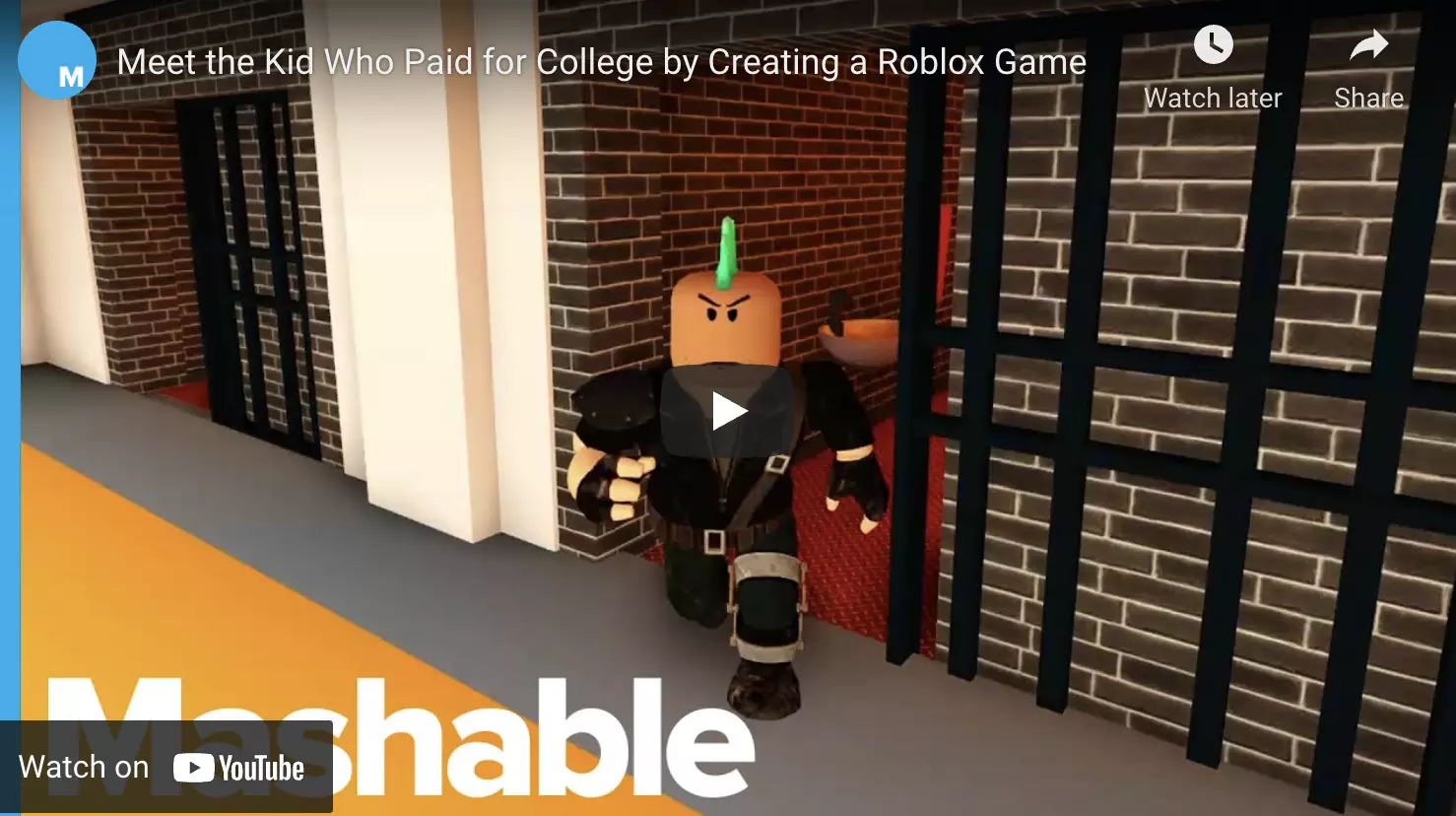Founded March 15, 2020 (just one year ago), Clubhouse is now valued at $1 billion.
Clubhouse has been through four funding rounds. It has raised a total of $110M in funding over 4 rounds. Their latest funding was raised on January 24, 2021 from a Series B round. It only has a dozen employees, but it's garnered millions of citizen-creators and citizen-marketers.
Clubhouse is one example of a tiny team exploiting a new business model and using emerging digital tools. It is also exploiting remote work -- depending on remote content creators who live in multiple cities.
The latest digital evolutions even empower 18-year-olds. Some earn up to $3 million per year. Alex (below) and his teenage partner (whom he's never met face-to-face) earned more than $1 million per year after launching Jailbreak on the Roblox platform.
Jailbreak is a cops and robbers game which is among the most popular games on the site, accumulating tens of thousands of concurrent players daily, and which has been played a total of 4 billion times as of August 2020.
In this video from January 2019, Alex describes how he developed Jailbreak and how it makes money through digital currency. He also describes the power of small, remote, distributed work-teams.

Network Orchestration
Network Orchestration, a digitally-charged business model, positioned Roblox for its $30 billion IPO. This model also catapulted Clubhouse from 2 million to 10 million users in two short months.
"I would caution calling network orchestration a new business model," Solomon Ray instructed me, "because it is the driving force of the largest companies in the world now." Lyft, AirBnB, and GitHub are Network Orchestrators. GitHub, where contributors invite collaborators, is pictured here.
Network Orchestrators create frameworks. Then they invite third parties to contribute content and products inside the framework (think Facebook and Zoom). Wikipedia defines Network Orchestrator Companies as:
"... companies [that] create a network of peers in which the participants interact and (participants) share in the value creation. They may sell products or services, build relationships, share advice, give reviews, collaborate, co-create and more. Examples include eBay, Red Hat, Visa, Uber, Tripadvisor, and Alibaba."
To visually understand Network Orchestration, Barry Libert, Megan Beck, and Jerry Wind, a renowned professor at the University of Pennsylvania, includes this graphic in their research paper called the Network Imperative:
In the case of Clubhouse, third parties create digitized content. Then, content creators and the audience invite friends and coworkers to un-recorded live "podcasts" on the platform.
For Roblox, kids hear about it mostly from friends. Then they spend hours upon hours on the platform navigating through 1,000s of games (apps), dressing their avatars, using Robux to buy advanced features along the way. Kids ask each other, What's your favorite Roblox game? How much Robux do you have? Do you own a Doge (in your Inventory)?"
The kids share virtual playdates and attend virtual birthday parties.
Over half of kids under 16 in America play Roblox.
With very little marketing, Roblox added 80 million users in 2020 alone. That's the power of Network Orchestration.
Empowering Citizen Creators (who become Citizen Marketers)
Clubhouse and Roblox provide a glimpse into important emerging trends: Citizen Content Creators, Citizen Developers, and Citizen Marketers.
On the Content Creation front, anyone can become host a radio show (Clubhouse), produce a game (Roblox), create a video (YouTube), be a journalist (Linkedin, Medium, Facebook). Everyone is invited to access a global audience. Everyday users are also invited to be micro-citizen-marketers and micro-citizen-influencers.
On the Citizen Developer front ...
"Development" is becoming more and more like Content Creation. Almost anyone can do it.
Even my 11-year-old son (who calls himself MiniNorse on Roblox) built a game (Run For Admin!) that attracted 15,000 players on Roblox (as you see below).
MiniNorse, who is standing on the right side of the picture below, taught himself to build this Roblox game by talking with his friends on Discord and watching YouTube videos. Yes, Discord and YouTube are also Network Orchestrators.
Enterprises can harness certain aspects of Citizen Development, too
Code Libraries, Open Source, and Low-Code development solutions, make it easier for large organizations to become faster, far more nimble, and agile.
The barrier to entry here is not individual employees, it's company culture. Is it open-minded? Is it willing to change, adapt?
As proven by Iterate's low-code Interplay platform, developers code software 10X faster and 10X cheaper than just a year or two ago. What used to take 8 months takes 3 weeks. To replicate the dynamic companies like Clubhouse and Roblox, and to be competitive, enterprises need to embrace low-code ...
Low-code is a completely different animal. Using Iterate.ai's Interplay as an example, the platform is a drag-n-drop, Lego-like coding environment. Each drag-n-drop container (a.k.a. module) is a pre-written piece of software. Interplay has 476 pre-written modules that access external APIs. Some connect directly to enterprise systems. Some include conversational commerce connectors. Some are voice enablers. As a super bonus, Interplay even includes highly advanced AI modules. Interplay enables AI in a Box. The AI can be modified and customized. But, no matter what, it's easy to get up and running.
Here is a drag-n-drop, low-code platform (Iterate's Interplay) in action:
Each module can be used as-is. Or it can be modified and customized, as you see below.
This low-code platform does double duty. It's a rapid digital prototyping platform. It's also middleware operating in production in giant enterprise environments. It's modernizing legacy systems as a bolt-on.
Reusable Code
Code-reuse will happen more than ever on modern software platforms. Kids, like my son, who develop games inside Roblox reuse a lot of code. And users of Interplay reuse code.
Code-reuse inside low-code platforms increases speed and decreases costs. Think of every module as a code library. The modules speed up everything from AI-based solutions to enterprise data integrations with Oracle, Salesforce.
Code-reuse is one of many reasons leaders from firms like Microsoft (Charles Lamanna) expect a Low-Code explosion.
Mind-boggling Infrastructure Change
The shift to Low-Code will impact us like the shift we're making to the Cloud.
Gartner expects the Low-Code market size to grow from a $10 billion in 2019 to $187 billion by 2030. That's 18X. Think about that. 18X.
Low Code will dramatically reshape the competitive landscape. Productivity will increase. AI will be easy to access. Creatives will become developers.
Low-code lives on the private or public clouds. It can also live in an edge computing environment -- embedded in IoT devices.
Low-code will make individual software developers more powerful. It will also open up a new class of less-technical software developers who speed up prototyping and deployment by 10X. We'll see more small teams launching Clubhouse and Roblox App-type solutions.
Open-Source Code Libraries
Democratized low-code platforms (like Interplay) empower developers to tap into Open Source Code Libraries, too. Low-code further fuels the Open Source movement, which is already snowballing.
"the open-source services industry is set to exceed $17B in 2019, and is expected to reach nearly $33B by 2022, according to CB Insights’ Market Sizing tool."
Open Source removes barriers to entry. Small teams or single developers -- people with little money -- can build quickly because code libraries are freely available. The growth of this movement is why Microsoft acquired GitHub for $7.5 billion.
Analysts expect vastly more Open Source Libraries to hit the market.
Open Systems, APIs, SDKs - Digital Accelerants
Clubhouse is invite-only -- but really, it's an open system. Roblox is also an open system. Both transfer power to the little people -- even creative little 11-year-old developer.
Roblox and Clubhouse give us a glimpse of what's to come. Leaders of large organizations need to prepare for this shift, too.
IDC believes low-code will pick up steam in the Enterprise -- power will transfer to the citizen, the non-developers, the lightly technical. By 2023, IDC predicts that walled gardens will be replaced with self-service models. IT-as-an-enabler and open models will become mission-critical:
As new technologies like low-code take hold, small teams and individual developers will launch more products faster, at far lower costs. Experimentation will be easier, as well.
Preparing for Your Future
IDC predicts that Digital-First Companies will drive 50% of the global GDP by 2023. IDC expects the digital economy will move from conceptual and aspirational to operational by 2023. Now is the time to transition your culture and adopt emerging tools. Do what IDC recommends, as summarized here:
Think of ways your company can behave a bit more like Clubhouse and Roblox. How it can it leverage Low-Code, use Open-Source, and be a Network Orchestrator -- where customers can be creators and where users are encouraged to be your citizen-marketers.
Your future, and mine, will depend on it.






















Leave your comments
Post comment as a guest